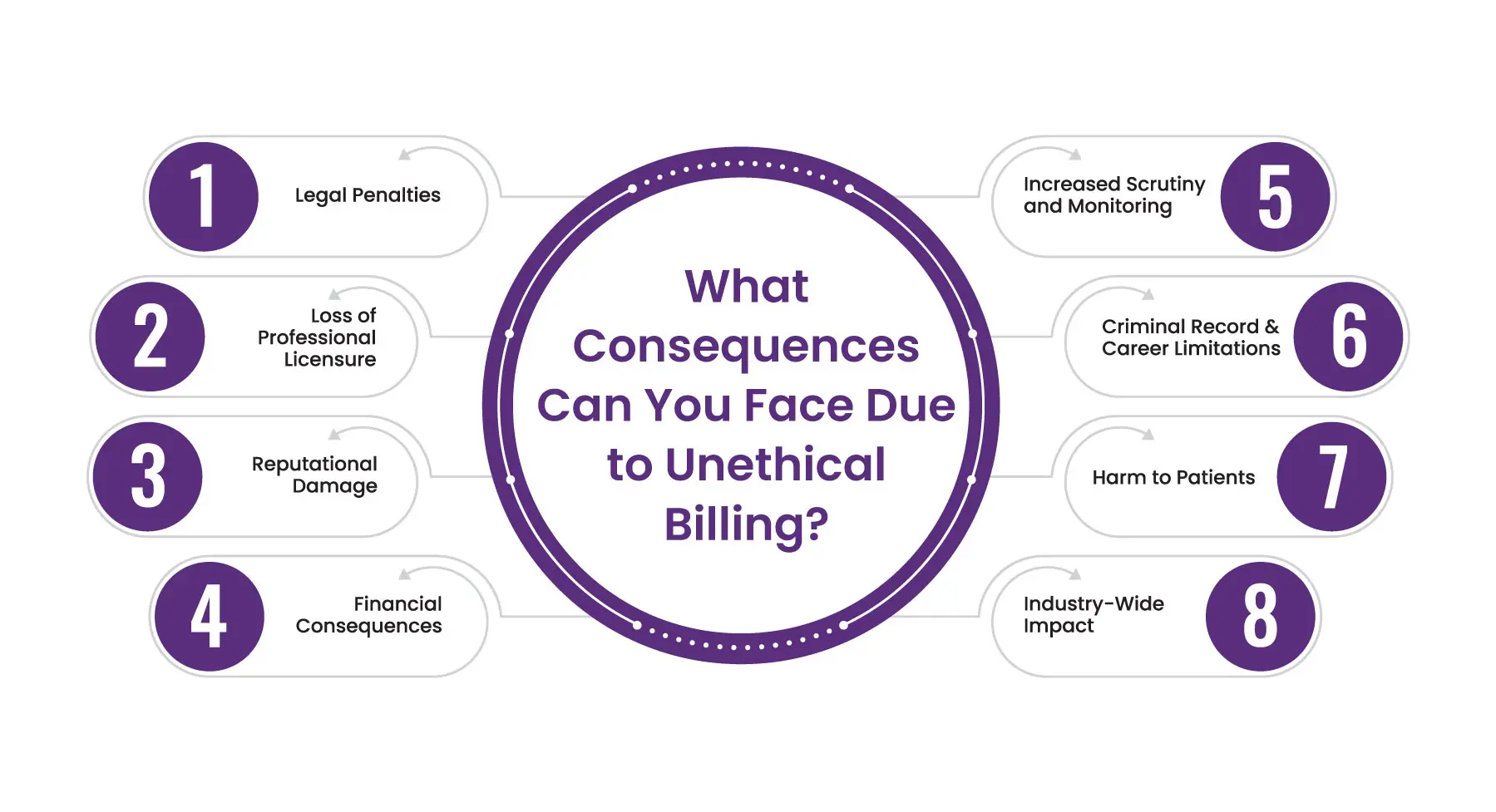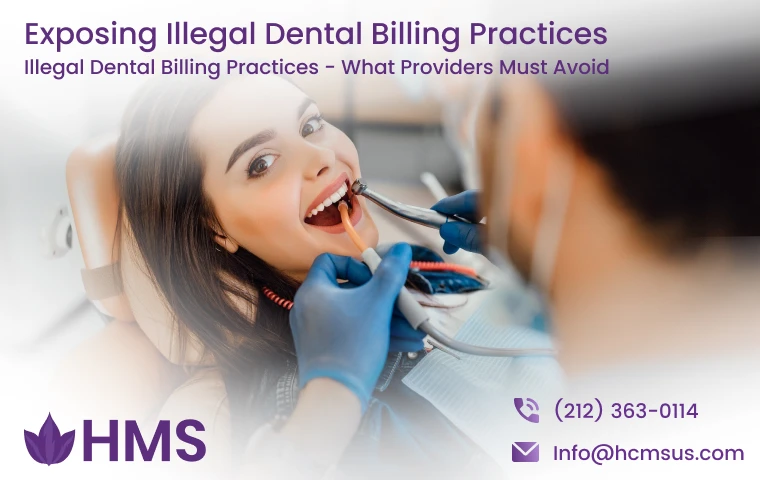When it comes to patient care, trust is the foundation of the patient-provider relationship. Unfortunately, not all practices uphold that trust, and if we specifically talk about dental care, illegal dental billing practices are more common than many patients realize. These unethical actions don’t just dent wallets—they shake confidence in the entire healthcare system.
Whether it’s upcoding, unbundling procedures, or charging for services never rendered, these practices aren’t just violations of law—they undermine the credibility of legitimate providers who are committed to doing things the right way. Even if you’re confident in your own billing processes, it’s vital to understand how these fraudulent practices arise and what steps you can take to prevent them from creeping into your workflows.
This blog is here to provide actionable insights for healthcare providers like you. We’ll delve into common illegal billing schemes, their consequences, and how you can ensure your practice remains compliant and patient-centered. Let’s take a closer look at the hidden challenges.
What is Unethical Billing?
Unethical billing refers to any dishonest or deceptive practice in charging patients or insurance companies for healthcare services. In the context of dental care, it means knowingly submitting false, inflated, or misleading claims to boost profits or cover losses. These practices violate the trust between providers, patients, and insurers and often lead to legal and financial repercussions.
For example, billing for treatments that were never performed, exaggerating the complexity of procedures to charge higher rates, or splitting services into separate claims to get paid more—these are all forms of unethical billing. While some instances may stem from genuine mistakes or misunderstandings, others are deliberate attempts to exploit the system.
Unethical billing doesn’t just hurt insurance companies; it damages patient trust, tarnishes the reputation of dental providers, and raises overall healthcare costs. For healthcare providers, it’s crucial to understand the fine line between acceptable practices and unethical behavior to maintain compliance and uphold the highest standards of care
Most Observed Unethical Dental Billing Practices
In the dental industry, some billing practices cross ethical boundaries and result in serious consequences for providers, patients, and insurance companies. Below, we outline the most observed unethical dental billing practices, how they manifest, and examples to illustrate each.
1. Upcoding Services
What It Is:
Upcoding occurs when a dental provider submits a claim for a more expensive procedure than what was actually performed. This inflates the reimbursement from the insurance company.
Example:
A patient receives a basic dental cleaning, but the provider bills the insurance for periodontal scaling and root planing—a far more complex and costly procedure.
Why It’s Unethical:
Upcoding misrepresents the services rendered, violating trust and insurance regulations. It can also lead to higher out-of-pocket costs for patients.
2. Billing for Services Not Provided
What It Is:
This involves charging patients or insurers for procedures or treatments that were never performed.
Example:
A provider bills for a filling in a tooth that was not treated during the visit or charges for an x-ray that was not taken.
Why It’s Unethical:
This practice is outright fraudulent and can severely harm a provider's credibility and expose them to legal consequences.
3. Unbundling Procedures
What It Is:
Unbundling refers to breaking down a bundled set of procedures and billing each component separately to maximize reimbursement.
Example:
A provider performs a root canal, which typically includes multiple steps billed as a single procedure. Instead, they bill each step—like x-rays, anesthesia, and the root canal itself—as separate services.
Why It’s Unethical:
Insurance plans often pay higher for bundled services. Unbundling artificially inflates costs and violates billing agreements.
4. Performing Unnecessary Procedures
What It Is:
This happens when a provider conducts treatments that are not medically necessary, purely to increase billing opportunities.
Example:
Recommending a crown for a tooth that could have been restored with a simpler filling, or insisting on multiple x-rays without clinical justification.
Why It’s Unethical:
It places patients under unnecessary physical and financial stress, damaging trust and violating professional standards of care.
5. Misrepresenting Diagnoses
What It Is:
This involves altering or falsifying a patient’s diagnosis to justify a more expensive or covered treatment.
Example:
Coding a toothache as an abscess to ensure coverage for a root canal procedure instead of the less expensive pain management approach.
Why It’s Unethical:
It distorts medical records, can harm patient care, and constitutes insurance fraud.
6. Duplicate Billing
What It Is:
Duplicate billing occurs when the same procedure is billed multiple times to increase reimbursement.
Example:
A provider charges for a dental cleaning on two separate claims for the same patient visit.
Why It’s Unethical:
It’s a clear attempt to manipulate the billing process, leading to potential audits and penalties.
7. Waiving Co-Payments Without Reporting
What It Is:
Some providers waive patient co-pays or deductibles without informing the insurance company but still bill the insurer for the full amount.
Example:
Telling a patient they don’t have to pay their co-pay but submitting a claim to the insurance company as though the patient had fulfilled their portion of the payment.
Why It’s Unethical:
This practice violates the terms of most insurance contracts and creates an unfair playing field among providers.
8. Billing for Higher Quantities
What It Is:
Submitting claims for a larger quantity of materials or medications than were actually used during the procedure.
Example:
Billing for three dental crowns when only two were applied, or charging for an entire box of fluoride when only a single dose was used.
Why It’s Unethical:
It misleads insurers and patients, inflating the cost of care and risking audits.
9. Falsifying Patient Information
What It Is:
Providing false patient details on claims to ensure insurance approval or reimbursement.
Example:
Using a different patient’s insurance information to cover treatments for an uninsured patient.
Why It’s Unethical:
It’s a form of identity fraud and can lead to significant legal repercussions for the provider and patient involved.
What Is Overbilling in Dentistry?
Overbilling in dentistry refers to the unethical practice of charging patients or insurance companies more than the actual cost or value of the services provided. This can involve inflating fees, charging for unnecessary or non-existent treatments, or misrepresenting procedures to claim higher reimbursements. Overbilling not only violates legal and ethical standards but also undermines patient trust and the integrity of the dental profession.
What Consequences Can You Face Due to Unethical Billing?
Unethical billing in dentistry carries severe consequences that can disrupt your practice, damage your reputation, and lead to significant financial and legal ramifications. Whether intentional or accidental, engaging in unethical billing practices violates trust with patients and insurance providers and invites scrutiny from regulatory authorities.

1- Legal Penalties
Unethical billing is often categorized as insurance fraud, a criminal offense that can result in harsh legal penalties.
-
Fines and Restitution: Dental providers found guilty of fraudulent billing may face fines ranging from thousands to millions of dollars, depending on the severity and scope of the offense. Courts may also require restitution payments to insurers or patients affected by the fraud.
-
Imprisonment: Serious cases of billing fraud, especially those involving deliberate falsification or large-scale schemes, can lead to imprisonment. Providers could face months to years of incarceration, depending on the jurisdiction and the degree of misconduct.
-
Civil Lawsuits: Patients, insurers, or regulatory bodies may file civil lawsuits against the provider, seeking damages that could drain financial resources and destroy the practice.
2- Loss of Professional Licensure
Your license to practice dentistry is one of your most valuable assets—and unethical billing can put it at serious risk.
-
Revocation of Licensure: State dental boards and regulatory authorities often revoke the licenses of providers caught engaging in unethical billing practices.
-
Suspensions and Fines: Even if your license isn’t fully revoked, you may face temporary suspensions, fines, or mandatory corrective actions that severely disrupt your ability to practice.
3- Reputational Damage
Reputation is critical in the dental field, where patient trust is paramount. Once unethical billing is exposed, rebuilding that trust can be nearly impossible.
-
Loss of Patient Trust: Patients who discover fraudulent billing practices may leave your practice, share negative reviews, or even report you to authorities.
-
Public Backlash: News of unethical practices often spreads quickly, especially in the digital age. Negative press coverage and online criticism can tarnish your professional reputation and dissuade new patients from seeking your services.
4- Financial Consequences
Unethical billing practices can have devastating financial impacts, both immediate and long-term.
-
Insurance Audits and Clawbacks: Insurers may conduct audits, uncover discrepancies, and demand repayment for overbilled claims, which can result in substantial financial losses.
-
Loss of Insurance Contracts: Providers caught engaging in unethical billing may lose contracts with insurance companies, cutting off a significant source of patient referrals and revenue.
-
Business Closures: The combination of fines, lawsuits, and loss of patient trust can force your practice into bankruptcy or closure.
5- Increased Scrutiny and Monitoring
Once caught, providers often face heightened scrutiny from regulatory bodies, insurers, and patients.
-
Frequent Audits: Regulators and insurers may subject your practice to repeated audits, increasing administrative burdens and exposing your operations to further risks.
-
Mandatory Compliance Training: Authorities may require you and your staff to undergo expensive and time-consuming training to address deficiencies in billing practices.
-
Damage to Staff Morale: A practice under investigation can strain employee relationships, reduce productivity, and lead to staff turnover.
6- Criminal Record and Career Limitations
A criminal conviction for billing fraud can have lifelong consequences, making it difficult to continue your career in dentistry or any related field.
-
Ineligibility for Future Licensing: Providers with criminal records for unethical billing may find it impossible to regain licensure in their field or obtain licenses in other states or professions.
-
Barred from Insurance Networks: Insurers may permanently ban providers from their networks, further limiting career opportunities.
7- Harm to Patients
Unethical billing doesn’t only harm the provider—it also puts patients at risk.
-
Higher Costs for Patients: Overbilling and unnecessary procedures increase out-of-pocket expenses, damaging patient trust and loyalty.
-
Legal Complications for Patients: In some cases, patients may unknowingly be implicated in fraudulent claims, leading to legal or financial complications.
8- Industry-Wide Impact
Unethical billing practices don’t just harm individual providers—they tarnish the reputation of the entire dental profession.
-
Increased Regulatory Oversight: Widespread unethical practices can lead to stricter regulations, higher compliance costs, and increased administrative burdens for all providers.
-
Higher Insurance Premiums: Fraudulent claims drive up insurance costs, which are ultimately passed down to patients and other healthcare providers.
How to Avoid These Consequences
Providers must prioritize transparency, compliance, and ethical integrity in every aspect of their billing practices to avoid the extreme repercussions of unethical billing. This includes:
-
Implementing Robust Internal Controls: Regular audits and clear documentation can help prevent errors and intentional misconduct.
-
Training Staff Thoroughly: Educating staff about proper billing procedures and compliance standards minimizes the risk of mistakes.
-
Fostering a Culture of Ethics: Establishing clear values and accountability within your practice ensures that every team member understands the importance of ethical billing.
Conclusion
Unethical billing in dentistry is a high-stakes gamble with potentially devastating consequences. From legal and financial penalties to irreparable reputational damage, the risks far outweigh any short-term gains. By committing to ethical billing practices, providers can protect their careers, maintain trust with patients, and uphold the integrity of the dental profession.
To ensure compliance and maintain transparency in billing, partnering with a reliable dental billing service can make all the difference. HMS USA LLC specializes in outsourced dental billing, offering expert solutions designed to the unique needs of dental practices.When you choose HMS USA LLC, you’re not just outsourcing a task—you’re gaining a trusted partner committed to the success and integrity of your practice.
ABOUT AUTHOR

Pedro Collins
As a blog writer with years of experience in the healthcare industry, I have got what it takes to write well-researched content that adds value for the audience. I am a curious individual by nature, driven by passion and I translate that into my writings. I aspire to be among the leading content writers in the world.
